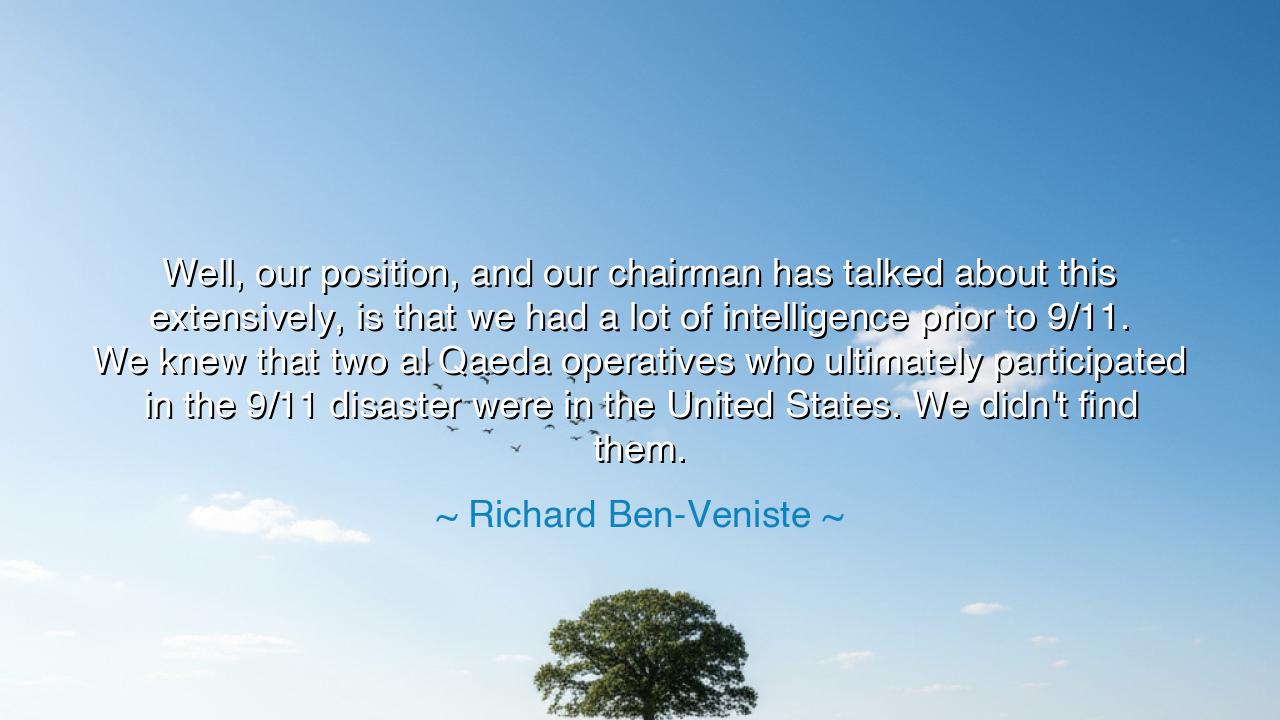
Well, our position, and our chairman has talked about this
Well, our position, and our chairman has talked about this extensively, is that we had a lot of intelligence prior to 9/11. We knew that two al Qaeda operatives who ultimately participated in the 9/11 disaster were in the United States. We didn't find them.






In the shadow of tragedy, the weight of knowledge unacknowledged can become unbearable. Richard Ben-Veniste’s words, “Well, our position, and our chairman has talked about this extensively, is that we had a lot of intelligence prior to 9/11. We knew that two al Qaeda operatives who ultimately participated in the 9/11 disaster were in the United States. We didn’t find them,” resonate with a solemn truth: knowledge, while powerful, is only as effective as the action it inspires. This tragic reflection reminds us that awareness without decisive action is not only a missed opportunity, but a failure that can reverberate with consequences beyond imagination. It is not enough to possess intelligence; one must also have the wisdom and resolve to act upon it.
Throughout the ages, leaders and warriors have been faced with the question of how to use the information they gather. In the ancient world, strategists like Sun Tzu understood that victory did not come merely from knowing the enemy, but from knowing when and how to act upon that knowledge. Sun Tzu’s famous dictum, “All warfare is based on deception,” speaks to the idea that intelligence is not simply about gathering facts, but about using them wisely in the heat of conflict. Ben-Veniste’s reflection on the intelligence about al Qaeda operatives before 9/11 carries the weight of a historical lesson: knowledge alone is not enough. Action must follow, and resolve must guide that action.
Consider the fall of Troy, where the Greeks possessed the knowledge of how to defeat the Trojans through the cleverness of the wooden horse, yet the path to success was not immediate. The Greeks had a wealth of intelligence—knowledge of the city’s defenses, weaknesses, and internal strife—but it was only through patience, strategy, and ultimately deception that they achieved victory. Had they acted without the necessary discipline or understanding, their knowledge would have been meaningless. Similarly, in the case of 9/11, the intelligence about the operatives in the United States was valuable, but without action, that knowledge was rendered impotent, and the tragedy unfolded.
The tragic lesson here is one of responsibility—the weight of knowledge must be matched by the courage to act. Consider the story of Abraham Lincoln during the Civil War, when he received intelligence that could have tipped the scales in favor of the Union. Yet, Lincoln did not rush to act; he waited for the right moment, understanding that a hasty decision could be as disastrous as inaction. When he did act—whether in issuing the Emancipation Proclamation or in key military decisions—it was because he had the wisdom to wait and the strength to move when the moment was right. His leadership was rooted in patience, but also in the clear understanding that the right intelligence, acted upon at the right moment, can change the course of history.
Ben-Veniste’s words serve as a painful reminder of the gap between knowledge and action. In our own lives, we often face moments where we gather the right information, but hesitate to use it. Whether in personal relationships, business decisions, or social justice, we may possess the knowledge of what should be done but fail to act because of fear, doubt, or complacency. The failure to act, as shown by the events leading to 9/11, carries consequences not just for the present, but for the future. It is a reminder that inaction in the face of knowledge is a form of surrender.
The lesson for us is clear: knowledge without action is like a sword in a sheath—it holds potential, but it is powerless until it is drawn and used. In your life, when you find yourself in possession of knowledge—whether about a problem, an opportunity, or a relationship—ask yourself: what will you do with it? Will you sit idly by, letting the moment slip past, or will you act, with confidence, resolve, and purpose? Just as Napoleon Bonaparte knew that great victories were won not by information alone, but by the boldness to act upon it, so too must we recognize that the greatest tragedies often occur when knowledge is left unheeded.
In the end, the true test of intelligence is not in the ability to gather facts, but in the courage to act on them. 9/11 stands as a somber reminder of what can happen when we fail to act upon the knowledge that is before us. Let us take this lesson into our own lives and strive to act decisively, guided by the wisdom to know when to act and the courage to follow through. Only then can we transform knowledge into power and purpose.






AAdministratorAdministrator
Welcome, honored guests. Please leave a comment, we will respond soon